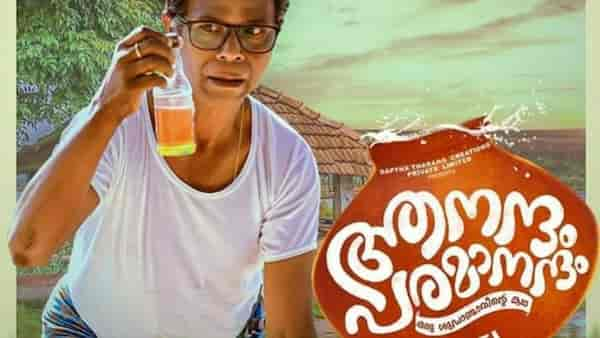Aanandham Paramaanandham review: Sharafudheen, Indrans’ trite social comedy scrapes by on its few winning moments
With jokes that don’t land and a storyline where worn out tropes gear heads from time to time, Shafi’s directorial does not seem to be a comedy that is in with the times.

Last Updated: 04.31 PM, Dec 23, 2022
Story:
Years after voluntarily retiring from his job as a postman, Divakaran Kurup, spends his days at the local toddy shop, his alcoholism putting a strain on his relationship with his wife and daughter. Divakaran meets his match in Gireesh, a Gulf returnee, who is as much of an alcoholic as the former. When Gireesh falls in love with Divakaran’s daughter, things between the two get heated.
Review:
The way Aanandham Paramaanandham starts off gives the impression that the film is not your run of the mill slapstick comedy. And the beginning definitely paved the way for the interesting way the story moved forward. But despite the fact that the storytelling certainly had its winning moments, the writing and script proved to be the major let down of Aanandham Paramaanandham.
The film features Indrans as Divakaran Kurup, a demure retired postman who is loved by everyone around him. But his alcoholism makes him spend most of his time at the local toddy shop, and is a cause of concern for his wife and daughter Anupama. His antics at the toddy shop even result in his daughter’s proposals being broken off. Despite trying to stop after listening to the pleas of his wife and daughter, Divakaran finds it easier said than done. The arrival of Gireesh, a Gulf returnee, further complicated Divakaran’s life, when the former falls in love with Anupama.
Ironically, the only reason he does not want Gireesh marrying Anupama is due to the fact that Divakaran sees the same faults he has in the young man, also a raging alcoholic. When Divakaran’s inability to give up drinking brings him on to the edge of losing his family, he takes a drastic step.
To give credit where it is due, director Shafi did try to tell the story in a way that made an attempt to keep audiences engaged. The opening sequence definitely manages to stoke the viewer’s curiosity, and the way it plays out, although a bit outlandish, does offer quite a few entertaining moments in the story as the film progresses.
The film deals with a social evil that filmmakers are not new with- the devastating effects alcoholism can have on a person’s life. Although unoriginal, the film’s attempts at making the severity of the issue pierce through does yield results at times, an example being a scene where a youth refuses to do his father’s last rights because it would require him to abstain from alcohol for 16 days. But as the film progresses, the message seems to get buried under the story of Divakaran and Gireesh’s ‘clash’.
The idealistic nature of the film also makes it come across as preachy sometimes, and, other than Indrans’ Divakaran, most of the other characters come across as incredibly one dimensional. Sharafudeen’s character is meant to be a resistant, stubborn alcoholic, but the characterisation reduces him to just that- sans any identity outside of being an alcoholic with a few comic lines to call out and look charming doing so. Slivers of misogyny sneak in when it comes to Anagha Narayanan’s character of Anupama, who is reduced to either an object of contention between Gireesh and Divakaran, or as simply existing to serve as the ‘incentive’ for the alcoholics to mend their ways. Some of the problematic messaging the film offers becomes clear when Divakaran himself declares that the reason he does not want Gireesh to marry Anupama is because the former sees a lot of himself in the young man. The character ‘growth’ Divakaran experiences too seems to be done in quite a problematic way as well. The writing definitely seems like a missed opportunity in the film.
Filmmaker Shafi has made a name for himself as one of the most popular helmers of Malayalam comedy films. But it seems like the director has not been able to move with the time, as Aanandham Paramaanandham comes off as a tad bit too outdated as far as humour is concerned, with jokes that don’t land and out of place humour. Although Baiju Santosh’s character exists purely for comic relief, he rarely delivers in this regard. Aju Varghese’s character too turns out to be forgettable. The writing and characterization however definitely did justice to Nisha Sarangh’s character of Gireesh’s mother, delivering a quick witted, smart character unafraid to speak her mind, despite her small role.
Verdict:
Aanandham Paramaanandham definitely has its moments, but the film’s writing and script weigh it down, with jokes that don’t land and an outdated premise, despite its attempts to tackle a relevant subject.

 Premium
Premium